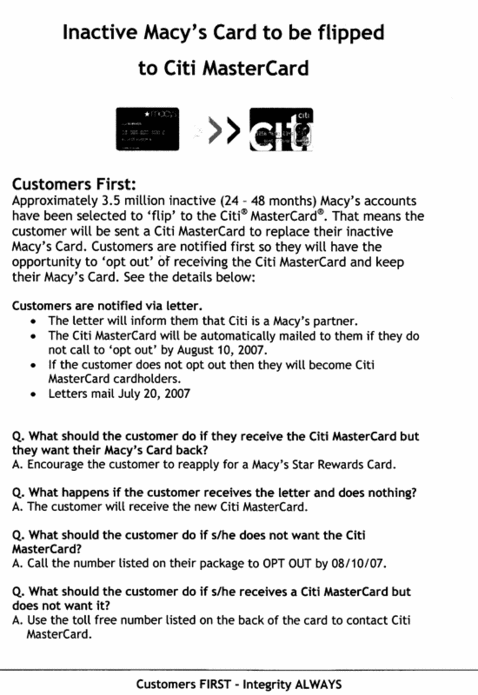Got An Inactive Macy's Store Account? Here's Your New Citibank Mastercard
Recently, a Consumerist tipster sent in an internal memo from Macy’s explaining that the store was “flipping” 3.5 million inactive store accounts into Citibank Mastercards. The memo reads:
“Approximately 3.5 million inactive (24-48 months) Macy’s accounts have been selected to “flip” to the Citibank Mastercard. That means the customer will be sent a Citibank Mastercard to replace their inactive Macy’s card. “
The “flip,” as they call it, was “opt-out”—which means that if you missed a recent letter from Macy’s explaining that they were going to open a credit card for you, you can expect a Citibank Mastercard in the mail.
We hadn’t heard of this questionable-sounding practice before, so we showed the memo to Elizabeth Warren, consumer law expert and Harvard professor. She hadn’t heard of it either, but expressed concerns about what this action by Macy’s might do to a customer’s credit score.
We were concerned, too. It didn’t seem possible for a store to simply decide to open an unrelated credit card account for customers who had inactive store cards. How was it happening?
Information Sharing
As far as we can tell, Macy’s is taking advantage of an “information sharing” clause in their original store card agreement. The clause states that Macy’s is allowed to share information with Citibank as an “affiliate” of Macy’s. Opting-out of the information sharing agreement requires calling or writing Macy’s. We suspect few card holders bothered.
Nowhere in the clause does it say that the term “information sharing” means that Citibank has the right to open new credit card accounts for inactive Macy’s store card holders. So why are they doing it?
Professor Ronald Mann of Columbia University is an expert on electronic commerce and the credit card industry, so we asked what he thought of Macy’s memo. Although Professor Mann had never heard of “flipping” either, he speculated that what was really going on was a “transfer of data” from Macy’s to Citibank.
” By aggregating this information with other information CitiBank has about these people, CitiBank would enhance its ability to design products that would both be profitable for CitiBank and attractive for these people. I expect that CitiBank paid Macy’s a substantial amount for the data,” he told Consumerist in an email.
It does seems likely that, in this case, the term “information sharing” is being interpreted to mean that valuable but “inactive” Macy’s customer’s accounts can be sold or transferred to Citibank, and Citibank can choose to open an account for said customers providing they do not opt-out.
Credit Score Implications
While we do not have specific information about the methods Citibank is using when they “flip” the inactive Macy’s accounts, we find it hard to believe that it will not affect credit scores.
Our best guess is that if you’re an inactive Macy’s card customer and you don’t opt-out in time, Citibank will have to ping your credit to determine the appropriate rate and limit to give you, which would look like an application for new credit and would drop your score temporarily.
At that point, if Citibank decided to give you a different limit than your Macy’s account had, your available/utilized credit ratio would change, which would affect your score either positively or negatively, depending on the individual. It’s our understanding that store cards are weighted equally to credit cards by FICO for this part of the score.
Canceling the inactive Macy’s account and replacing it with a new Citibank account would shorten credit history for some consumers, a change which would lower some scores.
The effect this new credit card will have on a credit score depends entirely on the individual. For some, it may help. Others will see a drop in their score that they did not know was coming. For those consumers who are mortgage or car loan shopping, the new card could pose trouble.
Privacy
We don’t know exactly what steps Macy’s has taken to ensure that it did not mail “opt-out” forms (and, eventually, credit cards) to old or outdated addresses. In addition, receiving an (apparently) unsolicited credit card in the mail is a “symptom” of ID theft and will likely alarm many consumers who disregarded Macy’s original “opt-out” letter as “junk mail.”
We expressed these concerns to Professor Warren, wondering if we might be making a mountain out of a mole hill. Turns out, she’s worried too, and said that although “flipping” seemed merely “sleazy” at first, she now thought it “costly to consumers.”
Consumerist called Macy’s Credit Services and asked if the accounts were really being “flipped.” Macy’s confirmed, and stressed that consumers could “opt-out.” We asked if the Citibank Mastercards offered any Macy’s benefits or were branded by Macy’s. Macy’s said the cards were standard Citibank Mastercards with no ties to Macy’s. They also confirmed that after 25 months in inactivity, Macy’s store cards would be “flipped.”
In addition, “flipped” customers can’t cancel by calling Macy’s. All cancellations must go through Citibank.
We have to wonder how Macy’s and Citibank can justify sending “opt-out” notices for something as sensitive as a new credit card account. As Professor Warren said, “I think the appropriate move here is to send a letter saying, ‘We’re closing all inactive Macy accounts. If you would like a Citicard instead, check the box.’ Why don’t they do that?”
Good question.
Want more consumer news? Visit our parent organization, Consumer Reports, for the latest on scams, recalls, and other consumer issues.


